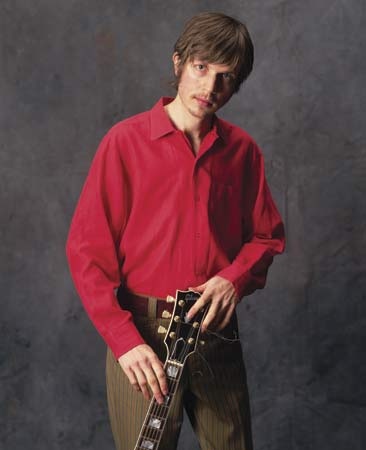Beck
American singer-songwriter
original name Beck David Campbell, also called Beck David Hansen
born July 8, 1970, Los Angeles, Calif., U.S.
 American singer-songwriter who brought Bob Dylan (Dylan, Bob)'s embodiment of the hipster folk minstrel into the age of hip-hop and sampling.
American singer-songwriter who brought Bob Dylan (Dylan, Bob)'s embodiment of the hipster folk minstrel into the age of hip-hop and sampling.Beck had art in his genes: his family included a mother (Bibbe Hansen) with ties to Andy Warhol (Warhol, Andy)'s Factory, a musician father (David Campbell) who would go on to arrange strings for several alternative rockers, and a grandfather (Al Hansen) who was active in the 1960s art movement Fluxus. After a brief excursion into the ‘‘anti-folk'' scene of New York City's East Village, Beck returned to his native Los Angeles, where he played at coffeehouses in the Silverlake district. "Loser," recorded as a cheap demo for Bong Load Custom Records, became a radio hit in Los Angeles and eventually, after Beck had signed with major label DGC, a national phenomenon. A rapped lyric performed over a slide-guitar sample, with impressive poetic juxtapositions such as ‘‘drive-by body pierce,'' "Loser" revealed a major talent, though Beck would find himself pigeonholed at first as a Generation X novelty act. The rest of Mellow Gold, his 1994 debut album, proved his mastery at a twanged-out meld of folk, rap, 1960s rock, and pop corniness of every vintage.
Beck's unusual contract allowed him to record for other labels: the more traditionally folk One Foot in the Grave came out on K and the noisy Stereopathic Soul Manure on Flipside (both were released in 1994). But he achieved culture hero status with Odelay, his 1996 major label follow-up. Produced by the Dust Brothers, who had helmed the similarly crackpot Beastie Boys (Beastie Boys, the) album Paul's Boutique (1989), Odelay stressed hip-hop and sampling even more than Mellow Gold had, including the single "Where It's At" (with its memorable chorus, ‘‘I've got two turntables and a microphone''). It established Beck as the leading alternative rocker for an audience that had grown weary of the earnestness of grunge. Adding to his palette, Beck explored the sophistication of Brazilian pop on his next album, 1998's Mutations (in part named after the psychedelic Brazilian group Os Mutantes). His return to beat-heavy abstract pop, Midnite Vultures (1999), which leaned more heavily than ever in a pseudo-rhythm-and-blues direction (Beck at this point was fond of unveiling James Brown (Brown, James)-style and break-dance steps in his live show), was a commercial disappointment. Somewhat like David Byrne (see Talking Heads) before him, Beck had so thoroughly conceptualized his art that the results were emotionally desiccated.
Alternately lush and spare, the melancholic follow-up, Sea Change (2002), containing some of Beck's most personal lyrics, met with some of the best reviews of his career. The tour in support of the album found the Flaming Lips sharing the bill and the stage (as backing band) with Beck. With his 2005 release, Guero, Beck was back to collaborating with the Dust Brothers and back to genre-hopping, as his musical scavenging led to the incorporation of elements of blues, Latin American music, rap-rock, and 1970s rhythm and blues; Guerolito, a track-by-track set of deluxe remixes of Guero by a host of other producers and performers, was released later in the year. Best known for his work with Radiohead, Sea Change's producer, Nigel Godrich, brought a spacey psychedelic gloss to The Information (2006), which came replete with stickers that invited listeners to create a do-it-yourself jewel box cover to mirror Beck's upbeat musical pastiche.
- Sheberghān
- Sheboygan
- Shebshi Mountains
- Shechem
- She Chi
- Shedd Aquarium
- Sheed, Wilfrid
- sheefish
- Sheehan's syndrome
- Sheela Basrur
- Sheeler, Charles
- sheep
- sheep's bit
- sheepshead
- sheet erosion
- sheet moss
- sheet-web weaver
- Sheffield
- Sheffield plate
- shehnai
- Shehu Ahmadu Lobbo
- Shehu Shagari
- sheikh
- Sheikh Hamidou Kane
- Sheikh Hasina Wazed